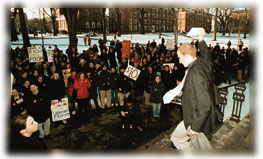![]()
Main Menu ·
Search ·
Current Issue · Contact · Archives · Centennial · Letters to the Editor · FAQs
![]()
Main Menu ·
Search ·
Current Issue · Contact · Archives · Centennial · Letters to the Editor · FAQs
Students Protest Sweatshop Labor Rallying around University Hall during a March 9 faculty meeting, students celebrate Harvard's embrace of a "full disclosure" policy for licensees. Rose Lincoln |
Like a handful of other universities challenged by student activists, Harvard has moved toward requiring higher labor standards from manufacturers licensed to produce goods bearing its name. On March 9, the same day a large student protest rally took place, the University endorsed a policy of "full disclosure" that would obligate manufacturers to reveal the locations of their factories--something companies have traditionally been reluctant to do in the highly competitive apparel industry. Harvard also indicated that it is discussing with other universities the possible launch of a yearlong independent monitoring project that would gather information about factory conditions.
Notre Dame was first to mandate a stricter labor policy on its apparel, and highly publicized student efforts this past fall and winter have resulted in full disclosure policies at Georgetown, Duke, Princeton, Brown, and the University of Wisconsin. At Harvard, students have held rallies, distributed pamphlets, and petitioned the administration about the issue for the last year. "This campaign really has appealed to students. It's a more direct way to effect change--through our universities, rather than through consumer pressure," says Daniel M. Hennefeld '99, an organizer for the Progressive Student Labor Movement. The group also advocates guaranteeing factory employees a living wage, and student participation in implementing anti-sweatshop policies.
As the collegiate licensing industry has come under increased scrutiny, there have been several collaborative efforts to create unified licensing codes. As yet, they have met with limited success. But Rick Van Brimmer, who chairs the Association of Collegiate Licensing Administrators' labor-standards task force, says he doesn't think, "even at this point, there is a strong consensus among the universities as to where exactly we are all going to go together. The issue seems to be very institutional. Some have taken an aggressive approach. Others have declared themselves neutral."
Harvard has licensing contracts, which last for three years and are renewable, with 196 companies. Between 30 and 40 of the companies produce apparel. According to Kevin Scully, the University's trademark licensing coordinator, Harvard receives between $600,000 and $700,000 annually in royalties for its licensed products. Part of that money covers the cost of running the office; net profits of $250,000 to $300,000 annually are used for undergraduate financial aid.
~ Jennifer 8. Lee
Main Menu ·
Search · Current Issue · Contact · Archives · Centennial · Letters to the Editor · FAQs
![]()